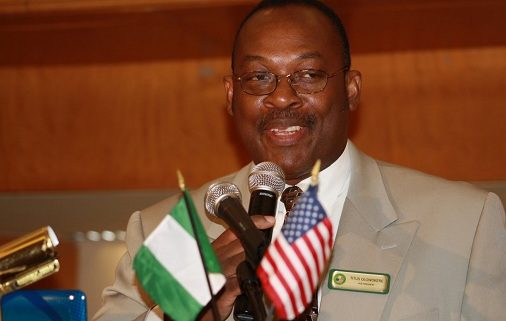By Titus Olowokere
In the grand tapestry of global commerce, the United States stands as a colossus—a $20 trillion marketplace of boundless opportunity. Its vast consumer base presents an alluring siren call to astute entrepreneurs worldwide. Yet, the specter of “Trumpera” trade tariffs—exemplified by a hypothetical 14% levy on Nigerian exports—casts a shadow over this gilded prospect.
For Nigeria’s indefatigable business luminaries, however, such barriers are not insurmountable walls, but hurdles to be vaulted with ingenuity and strategic acumen. By targeting high-potential sectors, capitalizing on niche markets, and leveraging e-commerce, Nigerian enterprises can ride the wave of U.S. demand for African-sourced goods. This article—anchored in data and real-life examples—charts a path for navigating tariffs, mitigating their impact, and seizing the American prize through strategic partnerships and trade agreements.
Agriculture: Fertile Ground for Innovation
Agriculture offers a natural starting point. Nigeria, Africa’s top cocoa producer, exported $300 million worth of cocoa in 2023—much of it destined for the U.S.’s $20 billion confectionery market. While tariffs threaten profit margins, the African Growth and Opportunity Act (AGOA) provides duty-free access for over 6,800 products, including cocoa.
To counter tariff effects, Nigerian exporters can target niche U.S. segments—such as the $1.5 billion organic chocolate sector—where premium pricing can absorb added costs. Consider Chocolala, a U.S. artisanal brand currently seeking 200 metric tons of Nigerian cocoa annually at $1.2 million, prioritizing sustainable sourcing. Moreover, processing cocoa into powder locally can slash tariffed volumes by up to 30%, aligning with American preferences for ready-to-use goods.
Fashion: Weaving Culture into Commerce
The fashion industry also presents a vibrant frontier. Nigeria’s textile sector, fueled by designers like Deola Sagoe, is tapping into the U.S.’s $400 billion apparel market—where African-inspired fashion is experiencing a renaissance. In fact, Ankara print sales on Etsy rose by 25% in 2024.
Though tariffs could dampen large-scale exports, e-commerce offers a nimble workaround. Platforms like Amazon and Shopify empower Nigerian SMEs to sell directly to U.S. consumers, with small-batch shipping strategies that often bypass bulk import duties. A practical example: Lagos-based Adire Textiles clinched a $500,000 deal with a U.S. retailer through Etsy in 2023, absorbing tariffs through premium pricing.
Strategic trade partnerships with American brands can further cushion costs. Co-branded lines with U.S. fashion houses enable shared tariff burdens while expanding brand visibility.
Technology: Tariff-Free Terrain
Nigeria’s burgeoning tech industry enjoys a unique advantage—it sidesteps tariffs entirely. The U.S. tech sector, valued at $1.8 trillion, is hungry for innovative, cost-effective solutions. In 2024, Nigerian fintech exports grew 40% to reach $150 million, according to Central Bank data.
Unlike physical goods, digital exports are duty-free. Firms like Paystack are thriving. In one case, a U.S. startup posted a $1 million contract for Nigerian developers to build a logistics app, reflecting growing demand for affordable tech talent in a post-tariff era.
Strategic alliances amplify this edge. Flutterwave’s 2023 partnership with a U.S. payment processor generated $5 million in joint revenue—underscoring the power of cross-border tech collaboration.
Food, Crafts, and Culture: Rich Tastes, Deeper Ties
The rising U.S. appetite for African-sourced products opens further doors. Nigeria’s cashew exports—worth $250 million in 2023—align well with the $135 billion U.S. snack food market, where plant-based trends dominate. USDA data shows cashew consumption rose 15% last year.
While tariffs affect raw exports, roasting cashews locally reduces shipping weight by 20%, thus lowering costs. One U.S. distributor, Nutty Co., is currently seeking 150 tons of roasted Nigerian cashews for $800,000—favoring value-added products.
Cultural goods are also gaining ground. In the $50 billion U.S. craft market, sales of Nigerian beadwork rose 30% on Amazon in 2024. Diaspora networks enhance this success; for instance, Atlanta’s Nigerian community generated $1 million in craft sales last year, leveraging tariff-light channels through direct trade.
Three Winning Strategies for Nigerian Businesses
To unlock the U.S. market and cushion against tariffs, Nigerian businesses should consider three powerful strategies:
-
Trade Partnerships: Collaborating with U.S. entities distributes costs and opens distribution channels. A U.S. cocoa buyer co-investing in a $2 million Nigerian processing plant is a case in point—offsetting tariffs while scaling supply.
-
Leveraging AGOA & AfCFTA: These frameworks ensure preferential access. AGOA alone saved Nigerian exporters an estimated $50 million in duties in 2023, according to NEPC.
-
Expanding E-Commerce: Online platforms dramatically reduce entry barriers. Nigeria’s exports via Amazon alone reached $10 million last year, underscoring the sector’s potential for SMEs.
The Role of Policymakers
Government support remains critical. Streamlining export procedures, strengthening quality assurance systems, and boosting investor confidence can elevate Nigeria’s global competitiveness.
With coordinated policy backing and entrepreneurial grit, Nigerian businesses can turn transatlantic alliances and tech-driven sales into springboards for global success. The U.S. market—with its $10 billion annual trade with Nigeria—is no mirage. It’s a tangible opportunity awaiting strategic exploration.
As the world recalibrates post-pandemic and rethinks protectionism, the time is ripe for Nigerian entrepreneurs to assert their presence. The $20 trillion U.S. economy awaits—not just as a destination, but as proof of what’s possible when innovation meets determination.
Beyond tariffs lies opportunity; beyond uncertainty, prosperity. For those bold enough to seize it, the future is undeniably bright.
Titus Olowokere is the Executive Director/CEO of the U.S.-Nigeria Business Council, Atlanta, GA. He can be reached at tolowok@usnigeria.org | +1 404-939-4030
Share your story or advertise with us: Whatsapp: +2347068606071 Email: info@newspotng.com















